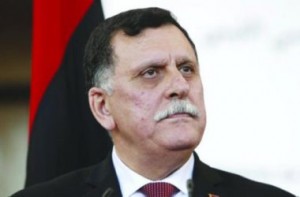By Sami Zaptia.

London, 7 June 2016:
Libya’s Government of National Accord Prime Minister-elect and head of its Presidency Council, Faiez Serraj, has . . .[restrict]sunk EU policy on illegal migration by refusing to accept migrants picked up at sea back onto Libyan territory.
The news comes as the Libyan Red Crescent updated the number of migrant dead bodies washing up on the Zuwara coast over the last few days to 133.
Speaking over the weekend to a number of media outlets, Serraj rejected a Turkey-style deal with the EU to hold onto illegal migrants and possible refugees in ‘’reception centres’’ in Libya. Serraj said Libya and Turkey were different. Libya would not accept that the EU send them back to Libya to settle.
Serraj criticized the EU saying that bombing boats in the sea would not be the solution to illegal migration. He said that the solution must be found in the migrants’ countries of origin. He insisted that Libya would not allow migrants to use Libya as a transit country, however.
He said that the EU must send illegal migrants back to their home countries, adding that on this issue Libya and the EU were in disagreement.
Backing his Prime Minister-elect, Libya’s GNA Foreign Minister-elect, Mohamed Siala confirmed the position taken on the issue by Serraj. Siala reiterated that Libya would not be accepting back migrants that sailed from Libya.
Siala said that illegal migrants should be returned to their country of origin and not to the country of transit. He said that these had entered Libya illegally. Siala said that if a large number of illegal migrants accumulated in Libya with its relatively small population of over 6 million, they would have a great (negative) effect on Libya’s demographic make-up.
The highly experienced Siala, who had held a number of high governmental positions in the previous Qaddafi regime, including Deputy Foreign Minister, pointed out the existence of a Libyan-Italian agreement which stipulates that any illegal migrants that travel to Libya illegally, without documents or visas, cannot be returned to Libya.
He stressed that this agreement would be implemented.
These latest pronouncements by the UN-backed GNA through its Prime Minister-elect and Foreign Minister-elect will be a big blow to the EU. It completely scuppers EU anti-illegal migration policy in the central Mediterranean based upon installing a pro-EU Libyan government in Tripoli which was expected to agree to a deal on the lines of that struck with Turkey.
The EU had hoped that Libya would either retain most illegal migrants attempting to cross the Mediterranean or accept those rescued at sea into ‘’reception centres’’ on Libyan soil.
Meanwhile, international aid agencies such as MSF (Medecins Sans Frontiers) and Human Rights Watch (HRW) have been critical of EU policy intentions to return migrants to Libya.
MSF’s UK Executive Director, Vicky Hawkins, told Libya Herald today that “European governments should not be sending people back to Libya”.
“Last year MSF operated three rescue boats in the Mediterranean. 92% of our patients fleeing Libya by boat reported having directly experienced violence in the country, while 100% witnessed extreme violence against refugees and migrants including beatings, murders and sexual violence. No wonder people are trying to flee”.
“All European governments must uphold their legal and moral responsibilities and urgently increase the proper management of refugee claims across Europe. This is the only solution for this crisis that will not lead to an unacceptable level of suffering”, she concluded.
It added that ‘‘partnering with Libya on migration would be disastrous. While smugglers bear direct responsibility for sending boats from Libya, European governments share moral and political responsibility’’.
It is worth pointing out to readers that while the issue of illegal migration is very prominent in EU political and media debates, it figures very low on the minds of Libyans and on the internal Libyan political agenda.
Libya is currently suffering a political and economic crises reflected in high foreign exchange rates, high prices and inflation, cash-shortages at banks, late salary payments and high rates of militia-related crime and kidnapping.
As most illegal migrants are loaded onto their boats away from prying eyes, usually after midnight, Libyans get to see very little of the phenomenon at home. [/restrict]





